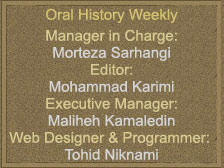| No. 215 | 12 August 2015 |
The Methodology of Oral History of Sacrifice and MartyrdomThe 9th professional session of Iranian Oral History and its main subjects was one of the best actions taken in evaluating the conditions of oral history of sacrifice and martyrdom. Valuable articles in different subjects were presented in this session in which the most prominent oral history experts and also the active centers were presentWe Learned the Techniques of ConcealmentThe adventures of a training trip to Egypt via SOMA OrganizationYears before Islamic revolution, many political activists and thinkers looked for a way to fight secretly with the regime and solve the country’s problems. Some of them after their struggles inside the country and its entanglements left Iran and followed their campaigns abroad. In those days, Sadegh Ghotbzadeh was in France, Taghizadeh was in England, EbrahmYazdi and Mostafa Chamran were in America and protected those who left Iran to follow their campaigns.Oral history & Interaction of National & Local IdentityKhorassan, particularly Mashhad has been the contemporary heart of revolutionary, cultural and religious intellect. From the Supreme Leader, Ayatollah Motahari, Martyr Hashemi Nejad and Ayatollah Tabasi to the Professor Mohammad Taghi Shariati and Dr. Ali Shariati are all prominent and famous intellects who come from this city.‘Persia to Iran’ published in AustraliaThe book ‘Persia to Iran’ by Nuran Zorlu, artist and photographer was published by Iran’s Cultural Attaché to Australia. According to IBNA correspondent, quoting from the public relations department of the Islamic Culture and Relations Organization, a book on introducing Iran titled ‘Persia to Iran’ by Nuran Zorlu, artist and professional photographer was published by the Iranian Cultural Center in Australia with a print run of 2,000 copieThe Man Who Survived Hiroshima: 'I had Entered A Living Hell on Earth'It is not as if Sunao Tsuboi needs another reminder of his violent encounter, as a 20-year-old university student, with a “living hell on earth”. The facial scars he has carried for seven decades are proof enough. But, as if to remind himself of the day he became a witness to the horrors of nuclear warfare, he removes a a black-and-white photograph and points to the shaved head of a young man looking away from the lens. Oral History Weekly Magazine Aims and Regulations
Oral History Weekly Magazine wishes to create a suitable place for thoughts and idea development; Its main field would be “Oral History” and subjects as telling & writing memoirs, writing diaries, travelogues, chronologies, and all other subfields of history which are presented in the form of news, articles, reports, notes, interviews and memoirs can be included. There is no limitation on the length of would-be-sent materials. Mentioning the name, academic background and email is necessary. Articles with complete references and bibliography are more credited and an abstract would quite helpful. Weekly is not about to publish any material consisting insults and libels about other people or anything that brings anxiety to public opinion. Weekly can edit and translate the received materials. The published articles and materials are only the writer’s ideas and Oral History Weekly Magazine has no responsibility about their content. |
 Daughter of Sheena-44 _____________________________ Sarpol-e Zahab was not the town that I thought. It was like a ruined village, with destroyed houses. It had no shops, or if there was, often it was put up shutters. Shutters had been warped by the blast or had been pierced. The streets had been reduced to a pile of rubble. Asphalt had been dug and when the car fell into potholes, our heads hit the car roof. We passed the deserted and quiet streets. All along the way sporadic shops were open on which fruit, meat, vegetables and daily necessities of people were sold. I said: “This is a ghost town.” He shook his head and said: “Well, it’s a war zone.”    |
